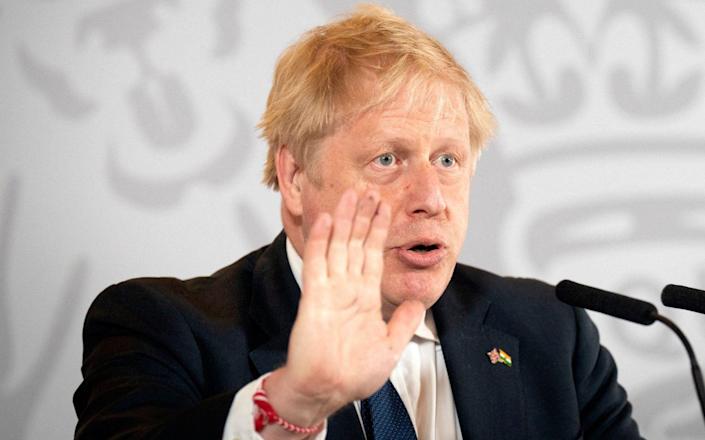
Boris Johnson has warned the UN secretary general that Vladimir Putin will try to “manipulate” his visit to Moscow this week into a propaganda victory for the Kremlin.
The Prime Minister is understood to be concerned about Antonio Guterres’ planned trip to see Putin and Sergei Lavrov, the Russian foreign minister, on Tuesday and on Sunday night told him to be “careful”.
Mr Guterres has already been accused of doing too little to help peace negotiations between Ukraine and Russia, amid wider criticism of the UN’s failure to restrain Putin’s aggression.
A Number 10 source said Mr Johnson on Sunday “warned the UN secretary general that Putin will seek to manipulate his visit” and told him that he should “be careful” of Kremlin propaganda.
Mr Johnson’s intervention comes as he will this week attempt to draw public attention back to his work on the war and domestic priorities after last week was dominated by “partygate”.
[embedded content]
On Monday he will visit North Wales, where he will talk up the prospect of a speedy trade deal with India, and the north west of England, to discuss government policy on football clubs.
However, he could also receive more fines over Downing Street parties, potentially overshadowing his attempts to “get on with the job”.
While an official readout of Mr Johnson’s call with Mr Guterres emphasised their “shared concerns” over the war and the “need to secure a ceasefire, facilitate humanitarian efforts and allow civilians to leave”, sources suggested tensions between the two over Mr Guterres’ visit.
It is feared the trip may achieve little in bringing Russia and Ukraine closer to peace but could give Moscow the opportunity to humiliate Mr Guterres or the wider West.
A previous visit by Liz Truss resulted in a tense press conference during which Mr Lavrov said their discussions were “like the conversation with a deaf person” before walking off stage.
A similar trip to Moscow earlier this month by Karl Nehammer, the Austrian chancellor, resulted in a “not friendly” meeting with Putin at his official residence in the Novo-Ogaryovo district.
Mr Nehammer was criticised for his attempt to negotiate with the Russian president, which the Czech foreign minister said was “naive” and one EU diplomat called “f—— pointless”.
[embedded content]
Mr Guterres’ trip also risks worsening relations between Nato leaders and the UN. The alliance has been frustrated at the UN’s lack of action on Russia, with the organisation hamstrung by Moscow’s permanent seat on the Security Council, allowing it to veto any resolutions on the conflict.
Earlier this month, Volodymyr Zelensky, the Ukrainian president, made a tense address to the security council, challenging it to act against Putin or dissolve itself.
“We are dealing with a state that is turning the veto of the United Nations security council into the right to die,” he said. “If it continues, countries will rely not on international law or global institutions to ensure security, but rather on the power of their own arms.”
Mr Guterres has spoken to Mr Zelensky once since the invasion, while Putin has declined his requests to open a dialogue.
Last week, the UN leader was urged by more than 200 former officials to intervene more stridently over the war. Days later, he announced plans for a “working lunch” with Mr Lavrov and an audience with Putin.
The leaders of France and Germany were criticised for visiting Moscow in last-ditch attempts to prevent the conflict, which other Western officials said were doomed to fail but risked legitimising the Kremlin. Emmanuel Macron and Olaf Scholz met Putin in the week before the invasion on Feb 24.
After his trip to Russia on Tuesday. Mr Guterres will travel to Ukraine, where he will meet Mr Zelensky and Dmytro Kuleba, the Ukrainian foreign minister.
A UN spokesman said the secretary general “hopes to talk about what can be done to bring peace to Ukraine urgently” and will meet agency staff providing support for refugees forced to leave their homes by the conflict.
The UN has continued to provide humanitarian support in Ukraine despite the failure of its political leadership to secure a peace deal. This week, the body will launch a fresh appeal for donations to fund its work.




